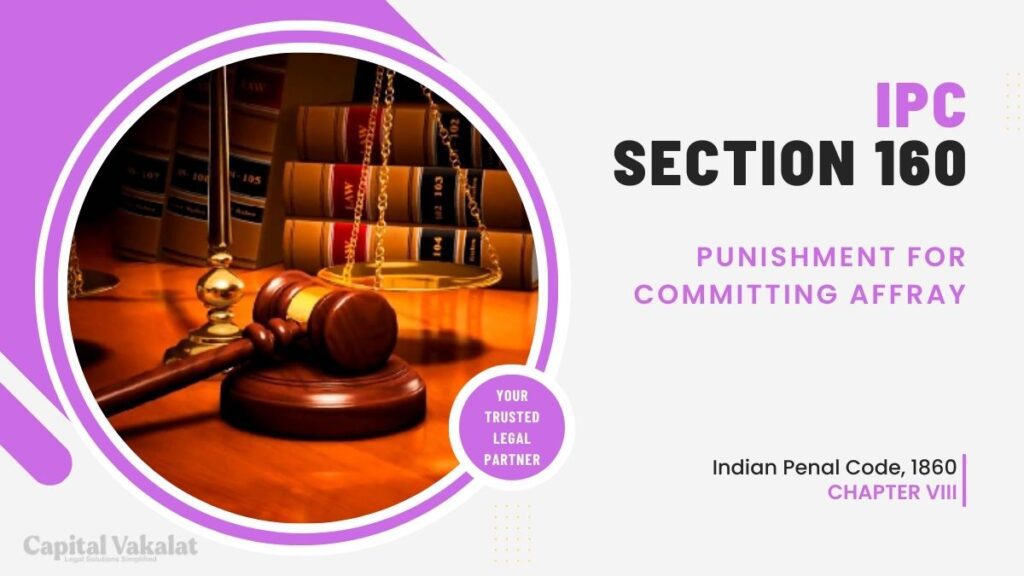Affray, a term often heard in legal circles, pertains to a situation that involves a certain level of public disturbance or unruly behavior. It is covered under Section 160 of the Indian Penal Code (IPC) and carries significant legal consequences.

This article aims to explore the concept of affray, the legal provisions related to it, and its relevance in contemporary society.
Understanding Section 160 of IPC
Section 160 of the IPC defines affray as an act by which two or more individuals disturb the public peace by fighting in a public place. It is crucial to recognize that this offense is distinct from individual acts of assault or fighting.
Elements of Affray
To establish a case of affray, there are key elements that must be met, including the involvement of two or more persons and the disturbance of public peace. The act must also occur in a public place or a location to which the public has access.
Punishment for Committing Affray
Individuals found guilty of committing affray can face penalties under Section 160 of the IPC. The punishment may include imprisonment or a fine, or both. It is essential to understand the severity of these consequences and the potential impact on one’s legal record.
Historical Perspective
Understanding the historical context of Section 160 of IPC provides valuable insights into its origins and evolution. Exploring its development over time can shed light on the intent behind its enactment.
Relevance of Section 160 IPC Today
In today’s society, where public gatherings and events are commonplace, Section 160 of IPC remains highly relevant. This section serves as a deterrent against unruly behavior and acts as a safeguard for maintaining public peace.
Cases Illustrating Affray
Examining real-life cases where affray charges were applied can help in comprehending the practical implications of this legal provision. These cases often provide insights into how courts interpret and apply the law.
Legal Defenses
Individuals accused of affray may employ legal defenses to challenge the charges. Understanding these defenses is crucial for those facing such allegations.
Role of the Police in Handling Affray
The police play a pivotal role in managing and mitigating affray situations. Their response can significantly impact the outcome of such incidents, making it essential to explore their responsibilities and powers.
Implications on Conviction Records
A conviction under Section 160 of IPC can have far-reaching consequences, affecting one’s personal and professional life. It is vital to be aware of how such convictions are recorded and disclosed.
Social and Ethical Aspects
Affray cases often raise questions about the ethical implications of public behavior and the social responsibility of individuals. These aspects deserve consideration in the broader context of community standards.
The Need for Reforms
In light of changing societal dynamics and legal developments, there may be a need for reforms in the application of Section 160 of IPC. This section discusses potential areas for improvement.
Challenges in Law Enforcement
Law enforcement agencies face several challenges when dealing with affray cases. Recognizing these challenges is essential for enhancing public safety.
International Comparisons
Comparing Section 160 of IPC to similar provisions in other countries can offer insights into how different legal systems address public disturbances.
Conclusion
In conclusion, Section 160 of IPC plays a crucial role in maintaining public order and safety. Understanding its provisions, implications, and historical context is essential for individuals and society as a whole. It serves as a reminder of the importance of responsible behavior in public spaces.
Frequently Asked Questions
What is the potential punishment for committing affray?
Those found guilty of affray may face imprisonment, fines, or a combination of both, as per Section 160 of IPC.
Can affray convictions impact a person’s future prospects?
Yes, convictions under Section 160 of IPC can have lasting implications on an individual’s personal and professional life.
Are there any legal defenses against affray charges?
Yes, individuals accused of affray may utilize legal defenses, such as self-defense or lack of involvement.
Is Section 160 of IPC specific to India, or do other countries have similar laws?
While the specifics may vary, many countries have legal provisions addressing public disturbances and affray, akin to Section 160 of IPC in India.